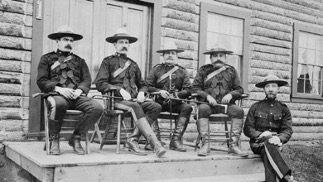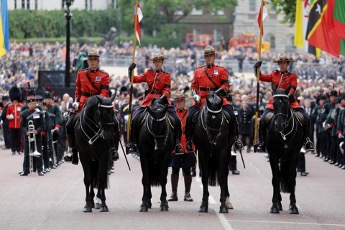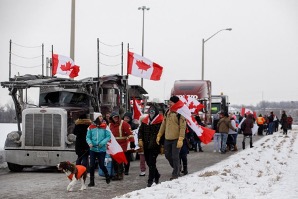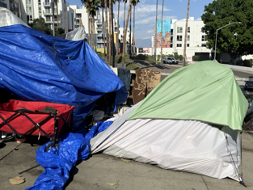Posted April 03, 2024
By Byron King
Canada’s Downfall
According to Canada’s National Post, from which I borrowed the headline above, the Royal Canadian Mounted Police (RCMP) has warned the government in Ottawa that “Canada may descend into civil unrest once citizens realize the hopelessness of their economic situation.”
 Predecessors to RCMP, North-West Mounted Police officers of the "B" Division, circa 1900.
Predecessors to RCMP, North-West Mounted Police officers of the "B" Division, circa 1900.
(Library and Archives Canada)
Per the RCMP, “The coming period of recession will … accelerate the decline in living standards that the younger generations have already witnessed compared to earlier generations.”
Furthermore, “The fallout from this decline in living standards will be exacerbated by the fact that the difference between the extremes of wealth is greater now in developed countries than it has been at any time in several generations.”
The report goes on to note, “For example, many Canadians under 35 are unlikely ever to be able to buy a place to live. … The situation will probably deteriorate further in the next five years as the early effects of climate change and a global recession add their weight to the ongoing crises.”
There’s much more. Indeed, there’s the usual doom and gloom approach of holding a bleak outlook on things. And then there’s this Canadian level of bleak future coming from an important arm of the government itself.
You want doom and gloom? Downfall? Look north, to Canada. And again, this message comes not from some bellyaching newsletter editor; no, it’s straight from the RCMP, Canada’s national police force, which runs a branch focused on social, political, and economic analysis.
In just a moment, I’ll explain more about what’s happening in Canada, so hold these thoughts…
Let’s Scrub Politics in the U.S. and Canada
First, I should note that for this month’s issue of Strategic Intelligence, my colleague Jim Rickards wanted to do a scrub on current U.S. politics and the possible transition to a Trump administration in the event Democrats somehow lose power in the upcoming election. And Democrats hate to lose power, if you get my drift.
In his article, Jim details the intricacies of governing a vast, complex nation like the United States of America. I love his reference to the Plum Book, which I recall from my days working in the Pentagon on the staff of the Chief of Naval Operations.
Yes, I assure you from first-hand experience: the Pentagon and Department of Defense are filled with civilian “plums,” meaning political appointees and their hired staffs of faithful party loyalists. Many of them—most, in my experience—never served a day in uniform, and even worse, they tend to be wacky policy wonks if not campaign contributors with their master’s degrees from Georgetown or Stanford and armchair dreams of becoming the next Karl von Clausewitz or Halford Mackinder.
Right now, throughout the U.S. Defense Department and indeed throughout the rest of America’s federal government, the policy priorities under Biden are clear: wokeness, diversity, climate change, anti-fossil fuels, and numerous other Progressive shibboleths. All this is being implemented via a faithful tribe of ardent, Left-wing true believers in every plum position of influence.
In contrast, and in a mythical alternate American political universe, we have the policy papers and books issued by the Heritage Foundation, which Jim references. And I’ll just say that I’ve long admired the comprehensive work that goes on there.
Along these lines, one key element of American elections and politics was memorably summed up long ago by Ronald Reagan, who quipped, “People are policy.”
That is, any serious change within the guts of government must come from the collective effort of many thousands of people who sign onto the president's agenda. And this fact of life pretty much sums up the frustrations and pitfalls of the Trump administration, 2017 – 2021. As in, yes; Trump won the 2016 election, but his bench of subordinate players – Trump’s plums – was thin and shallow. And it showed.
Which brings us back to Canada…
Oh Canada!
“With glowing hearts we see thee rise,
The True North strong and free!
From far and wide, O Canada,
We stand on guard for thee.”
So goes the anthem of our northern neighbor, but perhaps not for much longer if the RCMP is correct.
By way of background, in mid-2022 – just after the “Trucker” event; see below – the RCMP began work on a report for high-level political actors in Ottawa, the seat of Canada’s federal government.
The first cut of the RCMP report painted such a funerary image of a diminished future that it was officially classified as “Secret.” But some things are so incendiary that they don’t long stay under wraps. Heavily redacted, the report is now out there.
 RCMP on black horses at the funeral of Queen Elizabeth II.
RCMP on black horses at the funeral of Queen Elizabeth II.
Looking ahead, the RCMP opines that Canada’s current socioeconomic status “will probably deteriorate further in the next five years.”
Expanding on this, the RCMP states that “Economic forecasts for the next five years and beyond are bleak.” Ominously, the RCMP quotes French President Emmanuel Macron as saying that “the end of abundance” is coming to the West.
For most Canadians, the RCMP predicts a continuous decline in living standards. The report warns that Canada faces a dark future increasingly defined by unpredictable weather and seasonal catastrophes, such as wildfires and flooding.
The RCMP authors also add that Canada faces “increasing pressure to cede Arctic territory,” although the censors have redacted exactly how or to whom.
“The geopolitical, economic, social, technological and environmental shifts presented here are complex and continue to evolve,” according to the RCMP. “They can disrupt or redefine law enforcement work and operations in unexpected ways. Both minor and major shifts have the potential to cause multi-faceted disruptive change across the organization” (i.e., referring to the RCMP; BWK).
Another theme of the RCMP – one of several so-called “overarching considerations” – is that Canadians are becoming increasingly disillusioned with their government, which the authors believe is due to “misinformation,” “conspiracy theories,” and “paranoia.”
According to the RCMP, “Law enforcement should expect continuing social and political polarization fueled by misinformation campaigns and an increasing mistrust of all democratic institutions.”
The RCMP acknowledges that the COVID-19 pandemic severely impacted Canadian society. Its report states, “The damage to the economy and to the social fabric of the nation is ongoing, and there is an established opposition to existing and potential public health measures and other restrictions.”
On a personal basis, I have no reason to disagree with the RCMP. Since the mid-1980s, I’ve regularly traveled to Canada. Anecdotally, I’ve seen the country grow massively, as evidenced by the long boulevards lined with green-glass condos that one sees from Vancouver to Toronto, Ottawa, and Montreal.
Yet it also seems to me that, over the decades, Canada has become a poorer place for many of its citizens. For example, I’ve encountered many Canadians who work long and hard, yet still cannot afford to buy a house, exactly what the RCMP noted. More colloquially, I have yet to speak with a Canadian taxi driver who does not explain and complain about how tough it is to afford to live up there.
At a higher level of review, there’s Christian Leuprecht, a professor at Queen's University and Royal Military College who specializes in defense and security issues. He commented that the RCMP report highlights threats that are often overlooked, such as problems with global supply chains and the need to improve emergency management planning.
“What we see is some of the disconnect between the strategic threat assessment ... and the resources, capacities, capabilities and political will to posture Canada effectively for what is clearly going to be a very difficult future for this country,” Leuprecht said (emphasis added: BWK).
This brings us back to Jim’s point about policy and policymaking, both good and bad, which certainly happens in Canada and the U.S.
Policy and the Truckers
It’s fair to say that, with just a few exceptional periods of non-Liberal governance, for several generations, Canadian politics has been dominated by an Ontario-Quebec (and Vancouver) version of creeping, if not creepy, socialism. This long-term leftward ratchet has transformed much of Canada into a fast-growing, open-immigration, hyper-regulated, welfare-and-nanny state.
Worse, that particularly Canadian style and tendency of left-wing governance has recently drifted into the dangerous waters of outright authoritarianism. Widespread government promotion of assisted suicide, allegedly to save money on so-called “health care” costs, kind of speaks for itself. While restrictions on even basic free speech have grown dramatically; ask the distinguished, and heavily persecuted psychologist Jordan Peterson, for example.
In that vein, recall what happened in early 2022 with Canada’s so-called “Truckers” who rolled across the prairies into Ottawa.
On the surface, the Truckers were protesting burdensome COVID vaccination and quarantine mandates that destroyed the economics of their jobs and businesses. Their roadway protest began as a working-class revolt against hardline, politicized pseudo-science that was – at root, and we know it now – little more than a toxic mix of power-hungry political bossiness and medical quackery.
In January 2022, as the Truckers approached Ottawa, Prime Minister Justin Trudeau officiously refused to acknowledge any sense of legitimate grievance among the tens of thousands of participants. In fact, His Excellency refused even to meet with the protesters.
At one point, Trudeau called the collective Truckers racists and Nazis. This calumny was despite the fact that many of the protesters were people of color, First Nation members, veterans of Canada’s armed forces, immigrants from across the globe, and generally flag-waving Canadian patriots.
 Canadian Truckers, January 2022. Looks kind of patriotic, yes?
Canadian Truckers, January 2022. Looks kind of patriotic, yes?
We now know, in our 20/20 hindsight, that many of the draconian “follow the science” bromides from that sorry COVID episode were unnecessary, if not dangerously foolish, and even criminal acts.
But it’s also fair to say – and in its redacted report, the RCMP essentially says it – that public frustration ran far deeper than just the requirements for jabs and quarantines. Indeed, the Trucker episode revealed massive, class-based fault lines across Canadian society. The workers of the world just plain didn’t like the bosses, and definitely not the political hack bosses. So they united, and distinctly not in support of the Trudeau government.
With the RCMP report out in daylight, it’s evident that Canada’s deeply entrenched social and class problems have shifted from being merely anecdotal and gut-feeling perceptions; the issues are more than just occasional discussions with taxicab drivers.
Now, according to no less than the RCMP, we have confirmation that large segments of the Canadian people are continuously becoming poorer, despite the façade of a rising stock market and astronomical real estate prices. Indeed, the rise in asset prices is one key phenomenon that keeps a boot on the neck of tens of millions of Canadians, forced to live on the low rungs of an economic ladder they can never hope to climb.
The RCMP confirmed and summarized that this lack of economic hope and upward mobility in Canada is occurring in the world’s second largest nation by area, which borders three oceans and controls a landmass richly endowed with mineral, energy, and agricultural potential. Yet for all its deep well of resources, Canada grows poorer over time, or so sayeth the RCMP.
Along the lines of Jim’s discussion, at the end of the day much of our collective existence is impacted by government policy and the people who make it, whether in the U.S. or Canada.
With all its landmass, fresh water, fertile soil, minerals, and educated population, Canada ought to be a wealthy nation, growing wealthier. However, per no less than the RCMP, Canada is becoming poorer, and that’s genuinely a policy choice from the top of government down.
To wrap things up on this level, it’s no stretch to argue that many of Canada’s politicians and policy wonks, both current and legacy, are the wrong people for the jobs. That’s not just an opinion, either; no, it’s Canada’s RCMP putting it out, in so many words, in an official document labeled “Secret.”
Go Long on Hard Assets
Of course, what happens in Canada doesn’t stay in Canada. Or else we’d never have heard of Justin Bieber, let alone Justin Trudeau.
If the RCMP's comments about Canada’s declining economic and social prospects ring any bells, perhaps it’s because of their eerie similarities to what has happened in the U.S. A neighboring nation in decline is way too close for comfort.
For all the stock market gains, inflated real estate values, and other asset bubbles in the U.S., the country is clearly becoming poorer, not richer. Oh, you don’t believe it? Well, get away from the high-end zip codes and look around.
 Homeless encampment just outside Union Station, downtown Los Angeles. BWK photo (3/17/2024).
Homeless encampment just outside Union Station, downtown Los Angeles. BWK photo (3/17/2024).
Across America, people camp out on sidewalks and public parks. Roads are bad, as are bridges, ports, harbors, rail beds, schools, hospitals, airports, and EPA Superfund sites that have never been cleaned up despite the passage of half a century in some cases. All this and more.
Yet the U.S. government is also $34 trillion in debt, a number that rises by a trillion dollars every three months, per current spending trends. In other words, for all the money that flows out of the Treasury, it’s not as if much of it goes to things that matter in your day-to-day life.
What’s the answer? Well, 2024 is an election year, so vote really hard.
Meanwhile, in a world where government spending is out of control, you must own real assets when, where, and how you can. Own real estate in the right “location,” of course. Own insurance policies with cash value. Own real things that have productive potential, like machinery and tools.
Own gold and silver; own energy, like oil, gas, and uranium; Own some crypto as well because it has become a global idea for preserving wealth.
In other words, move money into sectors that will hold value as we all ride across the rocky road ahead.
If you don’t believe me, take a page from the RCMP, whose assessment and report state much the same thing.
On that note, we’ll end.
Thank you for subscribing and reading.